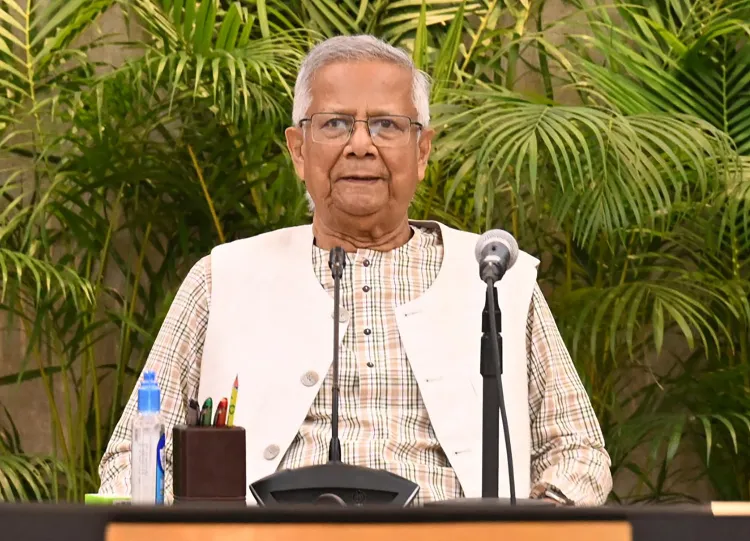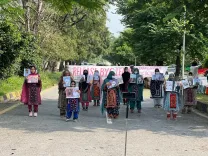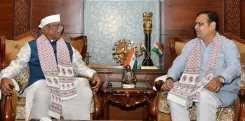What’s Behind Bangladesh’s Anti-Yunus Sentiment?

Synopsis
Key Takeaways
- Dr. Muhammad Yunus's leadership has faced significant public backlash in Bangladesh.
- The interim government's failure to conduct timely elections has fueled discontent.
- Policies perceived as authoritarian have alienated Yunus from previously supportive factions.
- Widespread protests highlight the urgency for democratic reform.
- Public sentiment is increasingly skeptical of the interim government's intentions.
New Delhi, June 1 (NationPress) Just nine months prior, Bangladesh appeared to be glowing with hope and reform. However, the once-bright horizon is now overshadowed by a growing storm of dissatisfaction. The central figure in this unfortunate turn of events is Nobel Laureate Dr Muhammad Yunus, whose rise to interim leadership was celebrated as a symbol of optimism following the July uprising.
Regrettably, the jubilant enthusiasm that initially surrounded his leadership has transformed into a pervasive anti-Yunus sentiment, echoing throughout the streets, institutions, and the national conscience.
Dr Yunus, who accepted the role of chief advisor to the interim government with broad support from civil society, political factions, and the military, now faces an existential dilemma. He has recently hinted at the prospect of resignation, driven by frustration over the escalating political crisis engulfing the country.
Some might suggest that the discontent he now finds intolerable is merely the bitter outcome of the very actions he initiated.
This interim regime was established with two honorable objectives: to govern the nation's affairs with fairness and to organize trustworthy elections that would restore democratic stability. The high expectations placed on Yunus were met with great confidence.
However, as soon as he began to outline his ambitious vision for reform, a significant rift emerged between the ruling elite and the very constituencies that had embraced his leadership. This divide has now widened into a considerable gap, exacerbated by policies viewed as unilateral and decisions interpreted as authoritarian, leading to alarm among both domestic stakeholders and international observers.
The interim government, while not bound by a specific term, was implicitly expected to be a temporary caretaker, similar to prior administrations that operated within a brief three-month timeframe. A survey conducted by the South Asian Institute of Policy and Governance (SIPG) in October 2024 indicated that 53 percent of Bangladesh’s electorate preferred a shortened tenure for the interim government.
Yet, Yunus and his team appeared to focus on an ambitious reform agenda at the expense of the critical need for timely elections. This insistence on structural reforms, however well-meaning, was interpreted by political factions as a disguised attempt to extend their unelected governance. Unsurprisingly, discontent reverberated through the halls of power, eventually spilling into the streets as loud protests.
Yunus’s repeated assertions about the necessity of reform, rather than galvanizing support, only intensified divisions within the party and produced legislative initiatives that many considered deeply troubling. It was only under relentless pressure from sustained public mobilization and political lobbying that he eventually proposed a tentative election schedule—initially set for December 2025 to June 2026, later pushed back to February-June 2026.
Even this postponement might have been acceptable if the government had provided a clear plan. Instead, its indecision only fueled suspicions regarding the true intentions of the interim administration.
Compounding the situation were comments from the home advisor suggesting that the populace desired the interim government to remain in power for “five more years”, along with Yunus’s ambiguous statement that the government would continue “as long as the people desire”.
These remarks only reinforced the notion that the interim government had become too attached to its power to relinquish it willingly. The military, once a tacit ally in this endeavor, began to exhibit signs of discomfort, with the Army Chief’s declaration that elections should occur by December serving as a subtle yet clear reproach.
However, the discontent was not restricted to electoral issues. Yunus’s venture into foreign policy, particularly his suggestion to create a humanitarian corridor into Myanmar’s Rakhine State, provoked widespread outrage. Critics, spanning the political spectrum and within the military, viewed this move as a perilous compromise of national sovereignty.
The lack of consultation leading up to this decision only heightened the backlash, with the Army Chief warning that such a corridor could evolve into a “bloody passage”, threatening both geopolitical stability and national pride.
Similarly, Yunus’s choice to grant operational rights of the Chattogram port to a foreign company—an action taken following a visit to the port city—was perceived as a reckless concession jeopardizing the nation’s economic autonomy. Once again, the absence of multi-party dialogue prior to such a significant decision rendered the act highly unpopular.
Perhaps the most serious miscalculation of the interim government has been its legislative experimentation, cloaked in the guise of reform but widely viewed as a political vendetta. Ordinances like the Cyber Protection Act, modifications to the International Crimes (Tribunals) Act, and the Enforced Law Ordinance have sparked widespread condemnation.
Human Rights Watch, along with numerous local and international organizations, has denounced these actions as a direct attack on fundamental freedoms and civil liberties. Ironically, Yunus, who has long criticized authoritarianism, now finds himself accused of emulating the very autocracy he once denounced.
Civil society, once his strongest ally, has now turned against him. Student groups, public sector employees, and professionals have united in a synchronized outcry of resistance. Since November 2024, the readymade garments sector—traditionally the backbone of Bangladesh’s export economy—has been beset by ongoing strikes over unpaid wages and demands for a higher minimum wage.
The government’s late wage increase did little to appease the workers, especially given an inflation rate that soared to 9.17 percent in April 2025.
The decision to split the National Board of Revenue (NBR) into distinct entities for policy and administration proved to be another self-inflicted injury. Intended to enhance efficiency, the reform instead triggered a full-scale strike, halting the nation’s import-export activities.
Employees demanded not only the repeal of the ordinance but also the removal of the NBR Chairman and full transparency regarding the recommendations given by international financial institutions, which many suspect imposed such changes as a precondition for financial assistance. Although the government ultimately withdrew the ordinance, the scars of mistrust remain.
If all this were not enough, the passage of the Public Service (Amendment) Ordinance marked a new low in the regime’s credibility. This law, which empowers the government to summarily dismiss civil servants without due process, has been widely labeled a “black law”—a nefarious tool for stifling dissent and entrenching executive overreach.
The subsequent protests within the Secretariat brought administrative operations to a standstill. The government’s response? The deployment of paramilitary forces—BGB, RAB, and SWAT—in a move chillingly reminiscent of the very regime that the July uprising had ousted for its fascist tendencies.
Thus, from its idealistic beginnings to its current state of near-pariahdom, the Yunus-led interim administration is accused of squandering a rare moment of national unity and hope. The disillusionment is not limited to the elite or the intellectuals—it has permeated the working class, the bureaucracy, and the youth.
The anti-Yunus wave is no longer merely a figure of speech; it has become a sociopolitical reality, as tangible as it is vocal.
In a tragic twist, the man once celebrated as a symbol of ethical governance and visionary leadership now finds himself facing widespread resentment. His administration, initially intended to serve as a transitional bridge to democracy, now threatens to become an obstacle to the very process it was designed to protect.
As Bangladesh navigates this period of democratic disenchantment, one is reminded of the timeless words of Charles Dickens: “It was the best of times, it was the worst of times.” For Dr Yunus, the pendulum has undeniably swung to the latter.
As the sun sets on this interim government’s moral authority, let us hope that the next dawn brings renewed dedication to democratic integrity. The soul of Bangladesh can only thrive not through decrees and dogmas but through the lifeblood of participatory governance, civil liberties, and above all, the sovereign will of its people.









